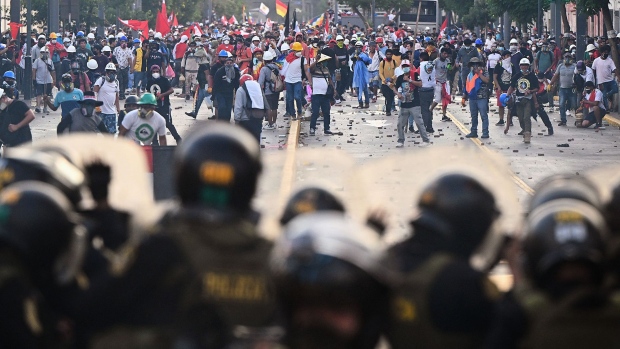Jan 30, 2023
Violent Chaos Has Cost Peruvian Farms $300 Million in Lost Exports
, Bloomberg News

(Bloomberg) -- In bad news for fruit consumers, exporting powerhouse Peru has lost about $300 million in farm shipments during eight weeks of violent turmoil, according to the nation’s agricultural association.
The hundreds of highway blockades that have restricted access to ports have hurt producers of grapes, blueberries and asparagus among other products, Gabriel Amaro, head of Peru’s agricultural producers association, AGAP, said in a telephone interview.
Peru is the world’s biggest blueberry exporter, was set to become the biggest global table-grape shipper and is a major supplier of asparagus. Its fruit supplies are especially critical to the US, where drought and storms have damaged crops, pushing up prices.
When trucks can’t arrive because of blockades, some operations have been forced to shut plants and suspend harvesting due to insufficient refrigerated storage space, Amaro said. Some producers have tried to send trucks along unpaved tracks through the desert. Thousands of small family farms have also suffered large losses.
PERU INSIGHT: Cost of Protests Is at 2% of GDP and Rising
“Small-scale family agriculture, which supplies the local market, doesn’t normally have refrigeration,” he said. “The exporters do have refrigeration, but they can’t wait weeks and weeks without being able to use the highways.”
The blockades by anti-government protesters have paralyzed swathes of southern Peru, the nation’s mining and tourism heartland, causing large economic damage.
So far, 58 people including a police officer have been killed in protests that erupted after President Pedro Castillo was impeached on Dec. 7 for attempting to dissolve congress.
Congress is meeting to debate early elections as a possible way out of the crisis. Amaro’s group is calling for security forces to clear the blockades. Late last week, police pledged to do so with military support.
(Adds importance of Peruvian exports in third paragraph)
©2023 Bloomberg L.P.






